For the 2025 school year, there is 1 public middle school serving 54 students in Armour School District 21-1. This district's average middle testing ranking is 2/10, which is in the bottom 50% of public middle schools in South Dakota.
Public Middle School in Armour School District 21-1 have an average math proficiency score of 34% (versus the South Dakota public middle school average of 39%), and reading proficiency score of 24% (versus the 49% statewide average).
Minority enrollment is 19% of the student body (majority American Indian and Black), which is less than the South Dakota public middle school average of 42% (majority American Indian).
Overview
This School District
This State (SD)
# Schools
3 Schools
297 Schools
# Students
224 Students
40,141 Students
# Teachers
20 Teachers
2,999 Teachers
Student : Teacher Ratio
11:1
11:1
District Rank
Armour School District 21-1, which is ranked within the bottom 50% of all 146 school districts in South Dakota (based off of combined math and reading proficiency testing data) for the 2021-2022 school year.
The school district's graduation rate of 80% has increased from 50% over five school years.
Overall District Rank
#114 out of 148 school districts
(Bottom 50%)
(Bottom 50%)
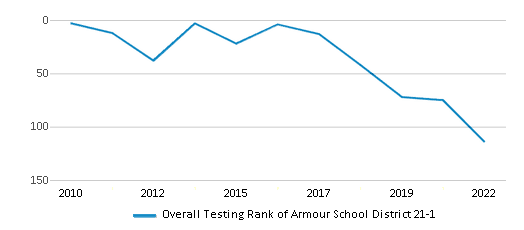
Math Test Scores (% Proficient)
35-39%
42%
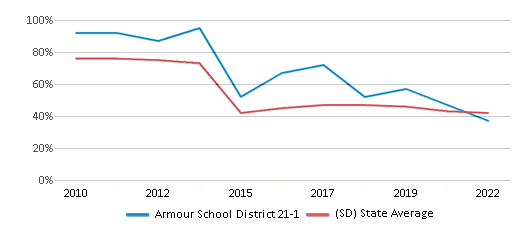
Reading/Language Arts Test Scores (% Proficient)
35-39%
51%
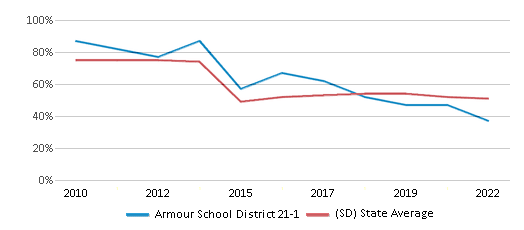
Science Test Scores (% Proficient)
30-39%
42%
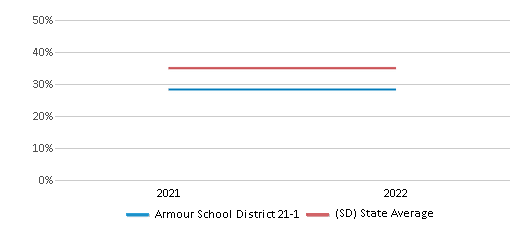
Graduation Rate
≥80%
82%
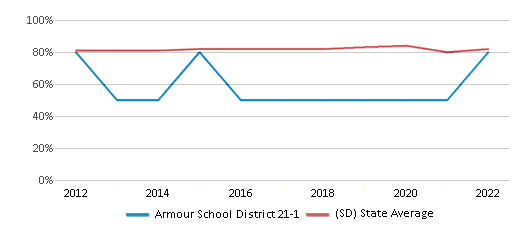
Students by Ethnicity:
Diversity Score
0.23
0.59
# American Indian Students
5 Students
10,455 Students
% American Indian Students
2%
26%
# Asian Students
n/a
519 Students
% Asian Students
n/a
1%
# Hispanic Students
9 Students
2,703 Students
% Hispanic Students
4%
7%
# Black Students
5 Students
1,024 Students
% Black Students
2%
3%
# White Students
196 Students
23,358 Students
% White Students
88%
58%
# Hawaiian Students
1 Student
46 Students
% Hawaiian Students
n/a
n/a
# Two or more races Students
8 Students
2,036 Students
% of Two or more races Students
4%
5%
Students by Grade:
# Students in PK Grade:
28
174
# Students in K Grade:
19
896
# Students in 1st Grade:
19
903
# Students in 2nd Grade:
16
918
# Students in 3rd Grade:
13
750
# Students in 4th Grade:
13
793
# Students in 5th Grade:
10
1,598
# Students in 6th Grade:
21
9,664
# Students in 7th Grade:
16
11,058
# Students in 8th Grade:
17
11,237
# Students in 9th Grade:
17
674
# Students in 10th Grade:
10
578
# Students in 11th Grade:
15
481
# Students in 12th Grade:
10
417
# Ungraded Students:
-
-
District Revenue and Spending
The revenue/student of $14,920 is higher than the state median of $13,121. The school district revenue/student has declined by 9% over four school years.
The school district's spending/student of $12,772 is higher than the state median of $12,623. The school district spending/student has declined by 9% over four school years.
Total Revenue
$3 MM
$1,916 MM
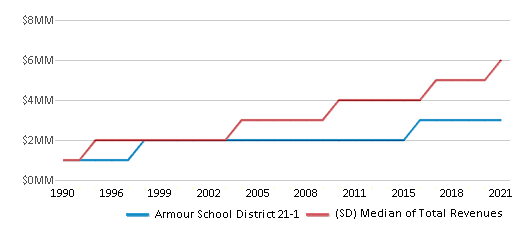
Spending
$3 MM
$1,844 MM
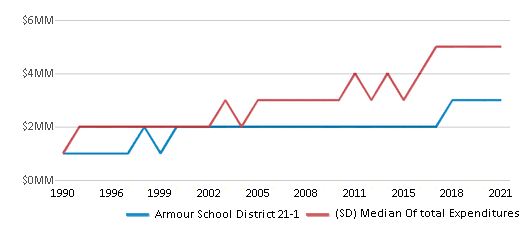
Revenue / Student
$14,920
$13,121
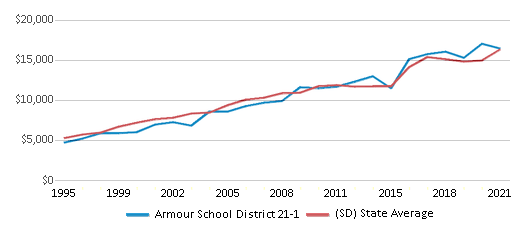
Spending / Student
$12,772
$12,623
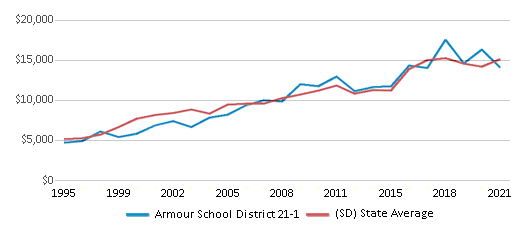
Best Armour School District 21-1 Public Middle Schools (2025)
School
(Math and Reading Proficiency)
(Math and Reading Proficiency)
Location
Grades
Students
Rank: #11.
Armour Middle School - 03
(Math: 30-39% | Reading: 20-29%)
Rank:
Rank:
2/
Bottom 50%10
905 Dobson Ave
Armour, SD 57313
(605) 724-2698
Armour, SD 57313
(605) 724-2698
Grades: 6-8
| 54 students
Recent Articles

Year-Round Or Traditional Schedule?
Which is more appropriate for your child? A year-round attendance schedule or traditional schedule? We look at the pros and cons.

Why You Should Encourage Your Child to Join a Sports Team
Participating in team sports has a great many benefits for children, there is no doubt. In this article you will learn what those benefits are.

White Students are Now the Minority in U.S. Public Schools
Increasing birth rates among immigrant families from Asia and Central and South America, combined with lower birth rates among white families, means that for the first time in history, public school students in the United States are majority-minority. This shift in demographics poses difficulties for schools as they work to accommodate children of varying language abilities and socio-economic backgrounds.





